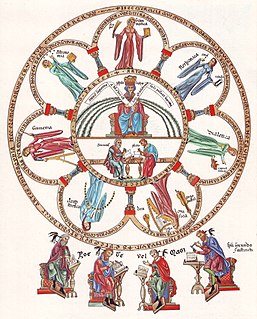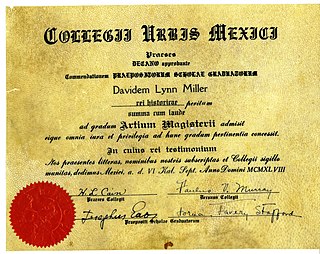
A liberal arts college or liberal arts institution of higher education is a college with an emphasis on undergraduate study in the liberal arts and sciences. Such colleges aim to impart a broad general knowledge and develop general intellectual capacities, in contrast to a professional, vocational, or technical curriculum. Students in a liberal arts college generally major in a particular discipline while receiving exposure to a wide range of academic subjects, including sciences as well as the traditional humanities subjects taught as liberal arts. Although it draws on European antecedents, the liberal arts college is strongly associated with American higher education, and most liberal arts colleges around the world draw explicitly on the American model.

Liberal arts education is the traditional program of education in Western higher education. Liberal arts today consists of four areas: the natural sciences, social sciences, arts, and humanities. Its central academic disciplines include physics, biology, philosophy, logic, linguistics, literature, history, political science, psychology, and mathematics. Liberal arts education can refer to studies in a liberal arts degree program or to a university education more generally. Such a course of study contrasts with those that are principally vocational, professional, or technical.

Roskilde University is a Danish public university founded in 1972 and located in Trekroner in the Eastern part of Roskilde. The university awards bachelor's degrees, master's degrees, and Ph.D. degrees in a wide variety of subjects within social sciences, the humanities, and natural sciences.
An academic degree is a qualification awarded to students upon successful completion of a course of study in higher education, usually at a college or university. These institutions commonly offer degrees at various levels, usually including bachelor's, master's and doctorates, often alongside other academic certificates and professional degrees. The most common undergraduate degree is the bachelor's degree, although in some countries there are lower level higher education qualifications that are also titled degrees.
A bachelor's degree or baccalaureate is an undergraduate academic degree awarded by colleges and universities upon completion of a course of study lasting three to seven years. In some institutions and educational systems, some bachelor's degrees can only be taken as graduate or postgraduate degrees after a first degree has been completed. In countries with qualifications frameworks, bachelor's degrees are normally one of the major levels in the framework, although some qualifications titled bachelor's degrees may be at other levels and some qualifications with non-bachelor's titles may be classified as bachelor's degrees.

A doctorate or doctor's degree or doctoral degree, is an academic degree awarded by universities, derived from the ancient formalism licentia docendi. In most countries, it is a research degree that qualifies the holder to teach at university level in the degree's field, or to work in a specific profession. There are a number of doctoral degrees; the most common is the Doctor of Philosophy (PhD), which is awarded in many different fields, ranging from the humanities to scientific disciplines.
Undergraduate education is education conducted after secondary education and prior to post-graduate education. It typically includes all the academic programs up to the level of a bachelor's degree. For example, in the United States, an entry-level university student is known as an undergraduate, while students of higher degrees are known as graduate students. In some other educational systems, undergraduate education is post-secondary education up to the level of a master's degree; this is the case for some science courses in Britain and some medicine courses in Europe.
Tuition payments, usually known as tuition in American English and as tuition fees in Commonwealth English, are fees charged by education institutions for instruction or other services. Besides public spending, private spending via tuition payments are the largest revenue sources for education institutions in some countries. In most countries, especially countries in Scandinavia and Continental Europe, there are no or only nominal tuition fees for all forms of education, including university and other higher education.

A diploma is a certificate or deed issued by an educational institution, such as college or university, that testifies that the recipient has successfully completed a particular course of study. The word diploma also refers to an academic award which is given after the completion of study in different courses such as diploma in higher education, diploma in graduation or diploma in post graduation etc. Historically, it can also refer to a charter or official document, thus diplomatic, diplomat and diplomacy via the Codex Juris Gentium Diplomaticus.
Habilitation defines the qualification to conduct self-contained university teaching and is the key for access to a professorship in many European countries. Despite all changes implemented in the European higher education systems during the Bologna Process, it is the highest qualification level issued through the process of a university examination and remains a core concept of scientific careers in these countries.
A Fachhochschule, abbreviated FH, or University of Applied Sciences (UAS) is a German tertiary education institution. Each institution specializes in a particular of applied science or applied arts, such as engineering, technology or business.
A licentiate is a degree below that of a PhD given by universities in some countries. The term is also used for a person who holds this degree. The term derives from Latin licentia, "freedom", which is applied in the phrases licentia docendi meaning permission to teach and licentia ad practicandum signifying someone who holds a certificate of competence to practise a profession. Many countries have degrees with this title, but they may represent different educational levels.
A research university is a university that is committed to research as a central part of its mission. It does not matter whether the institution is public or private, or how the research is funded. Such universities have a strong focus on research and often have well-known brand names. Undergraduate courses at many research universities are often academic rather than vocational and may not prepare students for particular careers, but many employers value degrees from research universities because they teach fundamental life skills such as critical thinking. Globally, research universities are predominantly public universities, with notable exceptions being the United States and Japan.
The Anglo-Saxon model or Anglo-Saxon capitalism is a capitalist model that emerged in the 1970s based on the Chicago school of economics. However, its origins date to the 18th century in the United Kingdom under the ideas of the classical economist Adam Smith.
Hochschule is the generic term in German for institutions of higher education, corresponding to universities and colleges in English. The term Universität is reserved for institutions with the right to confer doctorates. In contrast, Hochschule encompasses Universitäten as well as institutions that are not authorized to confer doctorates.

A vocational university, also known as university of applied sciences (UAS), polytechnic university, technological educational institute, applied technological university, or college of higher vocational studies, is an institution of higher education and sometimes research, which provides both tertiary and sometimes quaternary education and grants academic degrees at all levels in a variety of subjects.
The Bologna process for standardisation of European higher education specified an undergraduate degree of at least three years called the "licence" or bachelor's degree, followed by a two-year diploma called the master's degree, then a doctorate, meant to be obtained in at least three years. Because of these indicated schedules, the reform is sometimes (erroneously) referred to as "3-5-8". The system applies to the European Higher Education Area.
Higher education policy refers to education policy for higher education institutions such as universities, specifically how they are organised, funded, and operated in a society. According to Ansell (2006) there are "three different institutional forms of higher education provision: the Anglo-Saxon, Continental and the Scandinavian education system."
The European social model is a common vision many European states have for a society that combines economic growth with high living standards and good working conditions. Historian Tony Judt has argued that the European social model "binds Europe together" in contrast to the 'American way of life'.

A Doctor of Philosophy is the highest university degree that is conferred after a course of study by universities in most countries. PhDs are awarded for programs across the whole breadth of academic fields. As an earned research degree, those studying for a PhD are usually required to produce original research that expands the boundaries of knowledge, normally in the form of a thesis or dissertation, and defend their work against experts in the field. The completion of a PhD is often a requirement for employment as a university professor, researcher, or scientist in many fields. Individuals who have earned a Doctor of Philosophy degree may, in many jurisdictions, use the title Doctor with their name, although the proper etiquette associated with this usage may also be subject to the professional ethics of their own scholarly field, culture, or society. Those who teach at universities or work in academic, educational, or research fields are usually addressed by this title "professionally and socially in a salutation or conversation." Alternatively, holders may use post-nominal letters such as "Ph.D.", "PhD", or "DPhil". It is, however, considered incorrect to use both the title and post-nominals at the same time.






